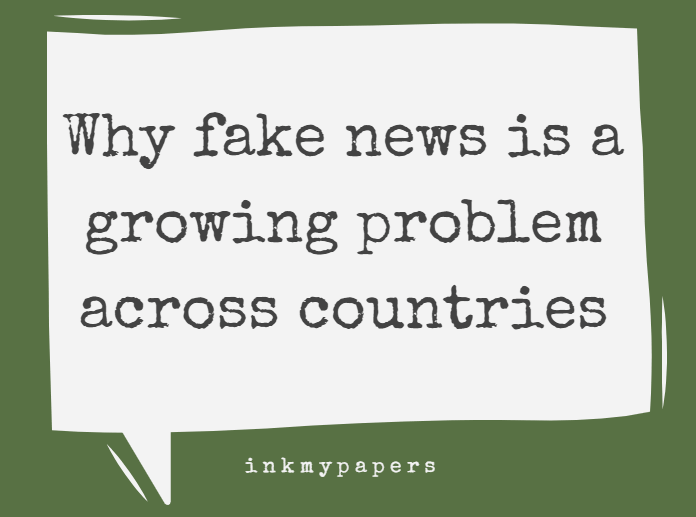
I have a confession to make. I am utterly sick of fake news.
Not just in the traditional sense of news that are fake, but also in terms of fake websites and scammy business.
And this is the motivation behind writing this piece. Everyday, we encounter customers telling us about being scammed by some essay writing services simply because most services duped customers by promising ‘quality’ work when they have no quality control and simply in this for the money.
Just like how fake news operate. Irresponsible journalism and usually created for a certain selfish agenda.
The Existence of Fake News
The internet landscape today has the potential to grant users access to vast amounts of information, but can equally become the source for misleading data. Fake news in particular has stood to be the most prevalent tool to misinform people, especially in countries with a sizeable social media presence and a polarised political scene.
Numerous definitions have been put forward by media scholars and journalists, but at its core, fake news is the use of false or misleading information to take on the appearance of valid news. The main purpose is to reach the most number of people within a given platform, in an attempt to sway opinion depending on the nature of the misinformation.
However, it has to be noted that the malice in the use of news and by extension the press, has existed before the age of the internet and social media. In Great Britain, numerous instances such as the supposed communist directive to British communists for mobilisation in 1924, as well as the nonexistent weapons of mass destruction held by Iraq in 2003, influenced public sentiment that resulted into political consequences.
The Effects of Fake News Worldwide
The global reach of the internet, and likewise social media, affords fake news numerous platforms from which to propagate misinformation. Combining it with the need of people online for easy answers and the way social media is designed for consumption furthers the impression among users that controversial information is legitimate, even if
The ramifications of subscribing to the reality presented by fake news are extensive, where it can disrupt community relations, interfere with democratic processes such as elections, and polarise public opinion. In effect, it serves the intention of its creators by creating the desired situation, which is to capitalise on the reach of the internet to impact online.
Perhaps the most popular example on how fake news had a significant bearing on the internal affairs of a country would be the 2016 United States presidential election, wherein the victory of Donald Trump was attributed to the proliferation of fake news during the campaign period. Alleged Russian interference, in the form of besmirching the reputation of then-candidate Hillary Clinton while promoting those of candidates such as Trump, was carried out mostly through platforms such as Facebook.
The diplomatic crisis in the Gulf region involving Qatar is another case where fake news has contributed to geopolitical tension among countries, in which several governments such as Saudi Arabia cut off ties with the country. Essentially, the Emir of Qatar supposedly expressed his support for rival countries and factions in the Middle East, which was eventually found to be a result of hacking but was nonetheless aired in countries within the region.
On a lesser scale, even fake news that is confined within a certain locale can upset the stability of communities, as shown in the various false reports within Singapore where a Filipino family came into conflict with a local event and the suspected collapse of a residential building. They were eventually proven to be both hoaxes after being reported by the media, wherein subsequent investigations revealed the incidents as fabrications.
Fake news in general has proven to be a pervasive issue across the globe, owing to the rate of social media use and internet literacy especially in countries with a developed communications infrastructure. With the expansion of internet access through the falling cost of internet-capable devices and the rollout of additional infrastructure internationally, fake news will remain a contentious issue in the future.
Combating Fake News
Countries worldwide have begun to realise the disruptive nature of fake news, which can affect their internal and external affairs, by having false information masquerading as factual data. To this end, initiatives such as media literacy and legislation banning disinformation have been launched to cultivate scrutiny among users and penalise the action of spreading fake news.
Technology companies, especially those with a focus on social media, have also launched their own efforts to address the issue of fake news, where platforms such as Facebook and Twitter have partnered with the academic sector to fact check content and banned dubious accounts, respectively.
Summary
The issue of fake news inherently lies in the misuse of internet platforms meant to facilitate a form of mass communication towards the general public, and to a larger extent the online global community. Taking on the form of news lends it the credibility that people have associated with the product of the journalistic profession, but instead misleads users into forming opinions based from a false source.
As the experiences of the aforementioned countries illustrate, the exchange and broadcast of information carry a great responsibility and an equally substantial amount of risk. The approach towards fake news should therefore be holistic, taking into account the users of the platforms as well as its owners.

0 Comments
Leave a reply
You must be logged in to post a comment.


